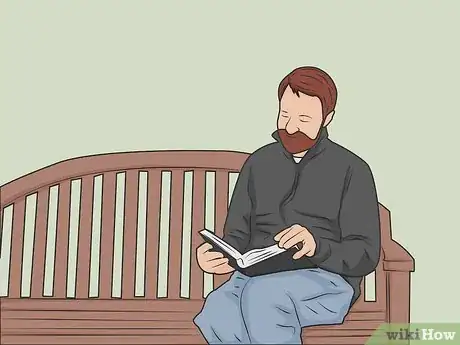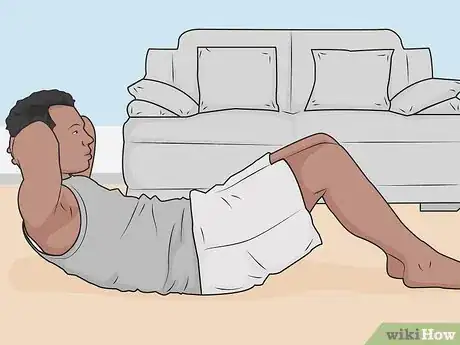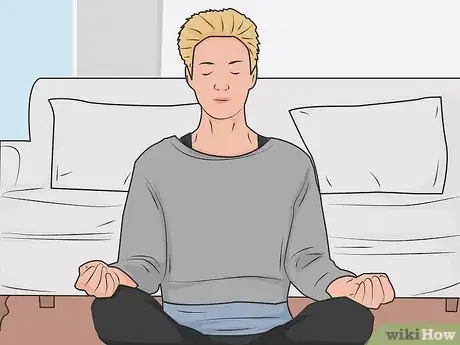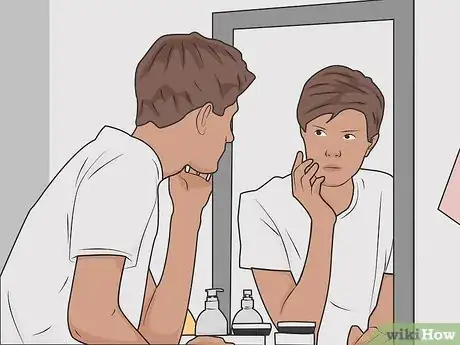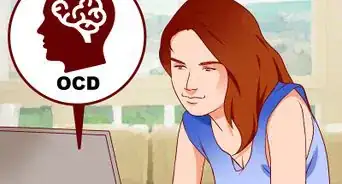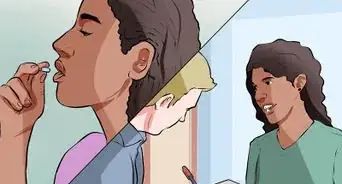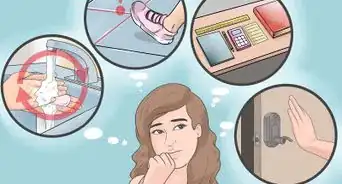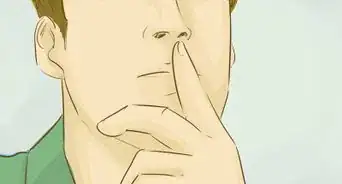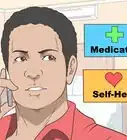This article was co-authored by Kirsten Thompson, MD and by wikiHow staff writer, Amber Crain. Dr. Kirsten Thompson is a Board Certified Psychiatrist, Clinical Instructor at UCLA, and the Founder of Remedy Psychiatry. She specializes in helping patients with mental health conditions such as major depressive disorder, anxiety, ADHD, bipolar disorder, OCD, PTSD, and postpartum depression. Dr. Thompson holds a BS in Operations Research Industrial Engineering from Cornell University and an MD from The State University of New York, Downstate College of Medicine.
There are 11 references cited in this article, which can be found at the bottom of the page.
This article has been viewed 12,453 times.
OCD rumination occurs when you experience repetitive cycles of harmful or intrusive thoughts. These thoughts are often about the past or things that you can’t change, which can make rumination tough to manage. If you’re experiencing OCD rumination, it's normal to feel anxious or depressed about your thoughts. Luckily, there are techniques you can try on your own to break negative thought cycles. A mental health professional can help your explore other promising treatments like medication and cognitive behavior therapy.
Steps
Shifting Your Focus
-
1Interrupt the cycle of thoughts with an active distraction. One of the keys to overcoming OCD rumination is finding ways to break the cycle of negative thoughts you’re experiencing. If you find yourself ruminating, force yourself to pay attention to something else. Reading a book, watching a movie, or listening to a podcast are just a few ways you might mentally shift gears.[1] [2]
- You could also do things like call a friend, go for a walk, or spend time with your pet. Anything that causes you to shift your focus will work, including boring stuff like chores!
-
2Change your environment and focus on what’s around you. A change of scenery is a simple but effective way to stop ruminating. Ideally, choose an environment that you enjoy! Getting outdoors can be particularly helpful, especially if you’ve been cooped up inside all day. A quick walk around your block can do the trick, but if you can, try hitting a nature trail, beach, or park. Nature can provide plenty of beautiful and interesting distractions.[3]
- Try focusing on something and describing it in your mind. Aim to create a running commentary about what you see.
- For example, you might think to yourself, “I see a tall tree with a thick trunk in front of me. The leaves are bright green and shaped like hearts. I see a bird's nest high up in the branches and two squirrels on a lower branch...”
Advertisement -
3Try exercising to snap yourself out of the negative thought cycle. Ruminating lulls you into a physically inactive state because your energy is being consumed by your thoughts. Getting up and moving your body forces you to funnel some of that energy into a physical activity instead.[4]
- Choose an exercise that you like, whether that’s running, cycling, or doing yoga. Anything that gets you moving your body is good.
- Exercise also produces endorphins that can reduce anxiety and improve your mood.
-
4Use meditation as a way to shift focus and manage your thoughts. Meditation and mindfulness techniques teach you to focus on the present moment and accept unwanted thoughts without judgment. These techniques can help you relax and gain control over your thoughts before you get stuck in another cycle. The goal is to eventually accept and let go of these unwanted thoughts.[5]
- Simple mindfulness techniques include focusing on things that you hear or sensations you feel in your body. For example, if you start ruminating in the shower, make yourself focus on the sound of running water instead.
- Formal meditation "anchors" you in the moment by teaching you to focus on your breath or heartbeat. The goal is to accept your thoughts without judgment or analysis and ultimately detach yourself from them.[6]
- You can check out YouTube tutorials and meditation apps if you'd like to try some simple guided meditations.
- You may want to talk to a mental health professional about the pros and cons of meditation before using it to help you with OCD ruminations.[7]
Controlling Intrusive Thoughts
-
1Face your thoughts head-on rather than trying to prevent them. Studies have shown that trying to prevent or repress intrusive thoughts can actually make them worse in the long run. It often feels like the anxiety associated with rumination is the problem, but keep in mind that the real problem is negative cyclical thinking, not anxiety. Ultimately, you have to face your thoughts in order to overcome them.[8]
- Trying to avoid your thoughts causes you to fear them, eventually leading to even more anxiety and ruminations.[9]
- If you find yourself actively trying to repress your thoughts, remind yourself of this motto: “If you want to think about them less, think about them more.”
-
2Question the validity of your negative thoughts. Just because you think it doesn’t make it true! If you catch yourself ruminating, stop and ask yourself why. Did something happen to trigger the thoughts? Are they based on facts or opinion?[10] If you can’t find any facts or evidence to back up your thoughts, you can deem them illogical. This may help you break the cycle.
- For example, maybe you're thinking, “Why am I not over my breakup with Sally yet? I’m such a sensitive baby. People get broken up with all the time and they seem fine. Why am I not fine? There’s something wrong with me.”
- Start questioning each claim and you may be able to reason your way out of it. For instance: "It’s only been a week since we broke up. That’s really not that long. Most people are upset for a little while after a breakup. It’s normal!”
-
3Carry a journal with you to help you identify your triggers. It may seem like your negative thoughts come out of nowhere, but there’s almost always a trigger, even if it’s a subtle one. When you catch yourself ruminating, stop to write down where you are, what just happened, the thoughts you’re having, and how the thoughts make you feel. After a while, you’ll start to notice patterns in these incidents and be able to pinpoint possible triggers.[11]
- Stopping to write in a journal interrupts your thoughts and forces you to concentrate on an action, so that aspect can also be helpful.
- Once you identify a trigger, do what you can to get rid of it or avoid it.
-
4Talk to someone you trust to get another perspective. A trusted friend or family member may be able to offer different perspectives or even remind you that your thoughts aren’t rooted in reality. Talking to someone also prevents you from isolating yourself. Isolation often worsens ruminations and cyclical thinking.[12]
- For example, tell them about the thoughts you’re having and ask them to explain why these thoughts are inaccurate or off-base.
Seeking Professional Help
-
1See a psychologist or psychiatrist to confirm the diagnosis. If you haven’t been formally diagnosed with OCD rumination, make an appointment with a mental health professional so they can assess what’s going on.[13] Tell your doctor what you’re experiencing and answer their questions truthfully. Be as accurate and detailed as possible.[14]
- Confirming the diagnosis will help your doctor recommend tailored treatment options to get you on the path to recovery.
- In can be hard to talk about private or negative thoughts with someone you just met. Keep in mind that everything you say to your doctor is confidential and you will not be judged. They are there to help you.
-
2Talk to your mental health professional about possible medications. There are a variety of medications available to treat OCD. Selective serotonin reuptake inhibitors (SSRIs) are the most common and have shown to be effective at reducing and managing OCD symptoms. Antipsychotic medications may also be helpful and some patients take both medications.[15]
- It may take 8 to 12 weeks before you notice an improvement after starting a new medication. Try to be patient.
- Do not stop taking your medication without telling your doctor first. Some medications cannot be stopped suddenly without causing possible health risks.
- Tell your doctor about any side effects as soon as possible, especially if the side effects are affecting your ability to function normally during the day.
-
3Explore cognitive behavior therapy techniques with your doctor. Cognitive behavior therapy (CBT) can be an effective treatment for OCD rumination.[16] There are many different CBT techniques out there, so talk to a mental health professional about exploring which techniques are best for you.[17]
- For example, CBT may include techniques like habit reversal training, self-management training, and exposure/response prevention.[18]
-
4Seek out support groups locally or online to help you cope. OCD support groups can be very beneficial You can share your OCD experiences with people who truly understand what you're going through and hear first-hand stories of their experiences. If you're feeling alone on your mental health journey, consider looking into local support groups or checking out an online or phone-based support group.[19]
- For help finding support groups, visit https://iocdf.org/ocd-finding-help/find-help/.
- For other resources, check out https://adaa.org/finding-help/telemental-health.
-
5Ask about new or experimental treatments that might be a good fit. This can be a good option if your OCD has been resistant to other treatments. New approaches in combination therapy and novel techniques like brain stimulation have shown promising results. If your doctor thinks you’re a good candidate, you may be able to take part in clinical trials for new OCD treatments and medications.[20]
- For example, Transcranial Magnetic Stimulation (TMS) is a new therapy that shows promise.
Expert Q&A
-
QuestionWhat is the most successful therapy for OCD?
 Kirsten Thompson, MDDr. Kirsten Thompson is a Board Certified Psychiatrist, Clinical Instructor at UCLA, and the Founder of Remedy Psychiatry. She specializes in helping patients with mental health conditions such as major depressive disorder, anxiety, ADHD, bipolar disorder, OCD, PTSD, and postpartum depression. Dr. Thompson holds a BS in Operations Research Industrial Engineering from Cornell University and an MD from The State University of New York, Downstate College of Medicine.
Kirsten Thompson, MDDr. Kirsten Thompson is a Board Certified Psychiatrist, Clinical Instructor at UCLA, and the Founder of Remedy Psychiatry. She specializes in helping patients with mental health conditions such as major depressive disorder, anxiety, ADHD, bipolar disorder, OCD, PTSD, and postpartum depression. Dr. Thompson holds a BS in Operations Research Industrial Engineering from Cornell University and an MD from The State University of New York, Downstate College of Medicine.
Board Certified Psychiatrist Cognitive Behavioral Therapy (CBT) is a great option! Mindfulness-based CBT and Exposure and Response Prevention (ERP) can be especially helpful.
Cognitive Behavioral Therapy (CBT) is a great option! Mindfulness-based CBT and Exposure and Response Prevention (ERP) can be especially helpful. -
QuestionHow does mindfulness-based cognitive therapy work?
 Kirsten Thompson, MDDr. Kirsten Thompson is a Board Certified Psychiatrist, Clinical Instructor at UCLA, and the Founder of Remedy Psychiatry. She specializes in helping patients with mental health conditions such as major depressive disorder, anxiety, ADHD, bipolar disorder, OCD, PTSD, and postpartum depression. Dr. Thompson holds a BS in Operations Research Industrial Engineering from Cornell University and an MD from The State University of New York, Downstate College of Medicine.
Kirsten Thompson, MDDr. Kirsten Thompson is a Board Certified Psychiatrist, Clinical Instructor at UCLA, and the Founder of Remedy Psychiatry. She specializes in helping patients with mental health conditions such as major depressive disorder, anxiety, ADHD, bipolar disorder, OCD, PTSD, and postpartum depression. Dr. Thompson holds a BS in Operations Research Industrial Engineering from Cornell University and an MD from The State University of New York, Downstate College of Medicine.
Board Certified Psychiatrist Mindfulness-based CBT teaches patients that everyone experiences unhealthy or unhelpful thoughts, and that those thoughts have no power until you assign it to them.
Mindfulness-based CBT teaches patients that everyone experiences unhealthy or unhelpful thoughts, and that those thoughts have no power until you assign it to them. -
QuestionWhat is the difference between CBT and ERP?
 Kirsten Thompson, MDDr. Kirsten Thompson is a Board Certified Psychiatrist, Clinical Instructor at UCLA, and the Founder of Remedy Psychiatry. She specializes in helping patients with mental health conditions such as major depressive disorder, anxiety, ADHD, bipolar disorder, OCD, PTSD, and postpartum depression. Dr. Thompson holds a BS in Operations Research Industrial Engineering from Cornell University and an MD from The State University of New York, Downstate College of Medicine.
Kirsten Thompson, MDDr. Kirsten Thompson is a Board Certified Psychiatrist, Clinical Instructor at UCLA, and the Founder of Remedy Psychiatry. She specializes in helping patients with mental health conditions such as major depressive disorder, anxiety, ADHD, bipolar disorder, OCD, PTSD, and postpartum depression. Dr. Thompson holds a BS in Operations Research Industrial Engineering from Cornell University and an MD from The State University of New York, Downstate College of Medicine.
Board Certified Psychiatrist ERP is actually a type of CBT! ERP gradually exposes patients to more challenging situations and stimuli that tend to trigger their obsessive thoughts.
ERP is actually a type of CBT! ERP gradually exposes patients to more challenging situations and stimuli that tend to trigger their obsessive thoughts.
Warnings
- If you're experiencing suicidal thoughts, please talk to a professional immediately. If you aren't sure how or where to seek help, start by visiting https://iocdf.org/ocd-finding-help/. You can also check out https://suicidepreventionlifeline.org/.⧼thumbs_response⧽
References
- ↑ Kirsten Thompson, MD. Board Certified Psychiatrist. Expert Interview. 18 August 2021.
- ↑ https://www.synergyresearchcenters.com/how-to-stop-ruminating-ocd/
- ↑ https://www.psychologytoday.com/us/blog/depression-management-techniques/201604/rumination-problem-in-anxiety-and-depression
- ↑ https://www.synergyresearchcenters.com/how-to-stop-ruminating-ocd/
- ↑ https://www.synergyresearchcenters.com/how-to-stop-ruminating-ocd/
- ↑ https://iocdf.org/expert-opinions/mindfulness-and-cognitive-behavioral-therapy-for-ocd/
- ↑ https://www.mayoclinic.org/tests-procedures/meditation/in-depth/meditation/art-20045858
- ↑ https://iocdf.org/expert-opinions/25-tips-for-ocd-treatment/
- ↑ https://adaa.org/learn-from-us/from-the-experts/blog-posts/consumer/how-take-power-back-intrusive-thought-ocd
- ↑ Kirsten Thompson, MD. Board Certified Psychiatrist. Expert Interview. 18 August 2021.
- ↑ https://www.psychologytoday.com/us/blog/mood-thought/201307/four-tips-habit-research-reduce-worry-and-rumination
- ↑ https://www.synergyresearchcenters.com/how-to-stop-ruminating-ocd/
- ↑ Kirsten Thompson, MD. Board Certified Psychiatrist. Expert Interview. 18 August 2021.
- ↑ https://www.aafp.org/afp/2015/1115/p896.html
- ↑ https://www.nimh.nih.gov/health/topics/obsessive-compulsive-disorder-ocd/index.shtml#part_145348
- ↑ Kirsten Thompson, MD. Board Certified Psychiatrist. Expert Interview. 18 August 2021.
- ↑ https://www.nimh.nih.gov/health/topics/obsessive-compulsive-disorder-ocd/index.shtml#part_145348
- ↑ https://adaa.org/learn-from-us/from-the-experts/blog-posts/consumer/how-take-power-back-intrusive-thought-ocd
- ↑ https://iocdf.org/ocd-finding-help/
- ↑ https://www.nimh.nih.gov/health/topics/obsessive-compulsive-disorder-ocd/index.shtml#part_145348


